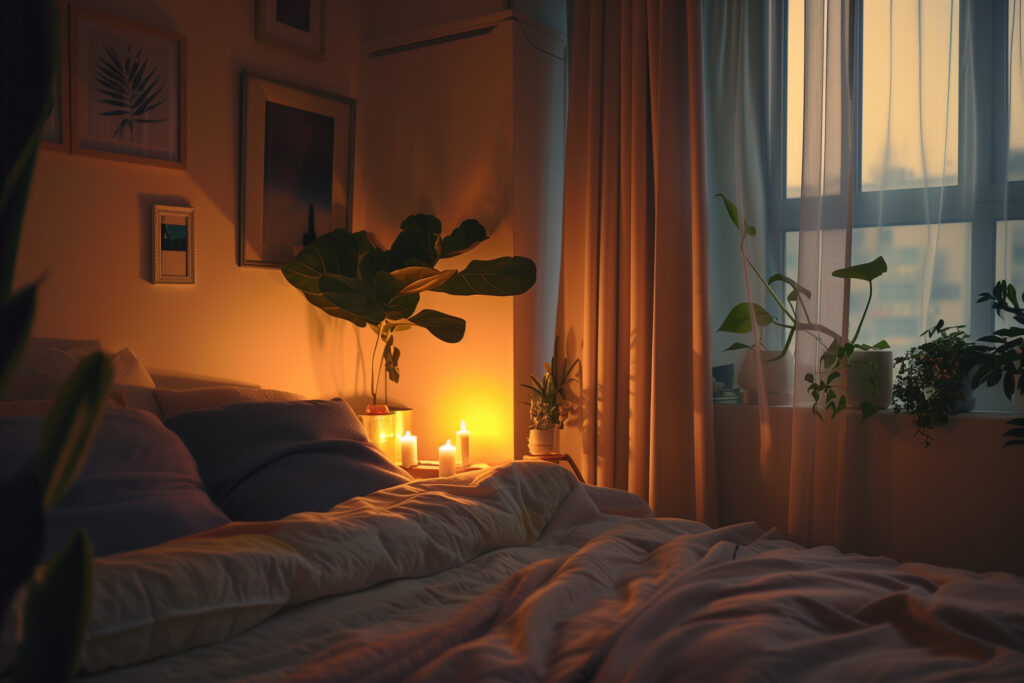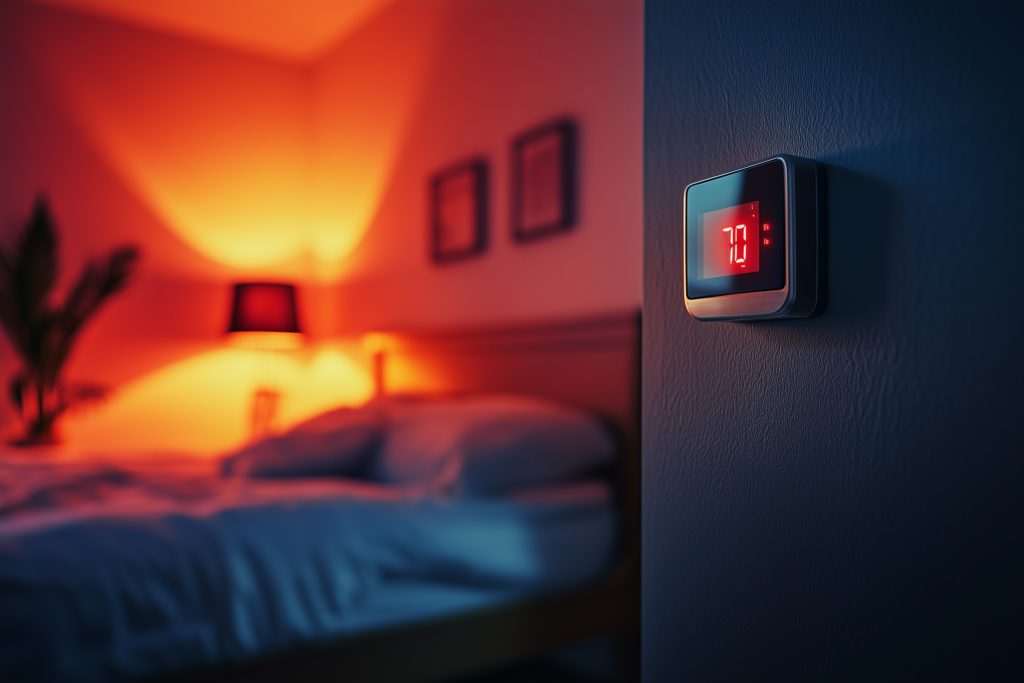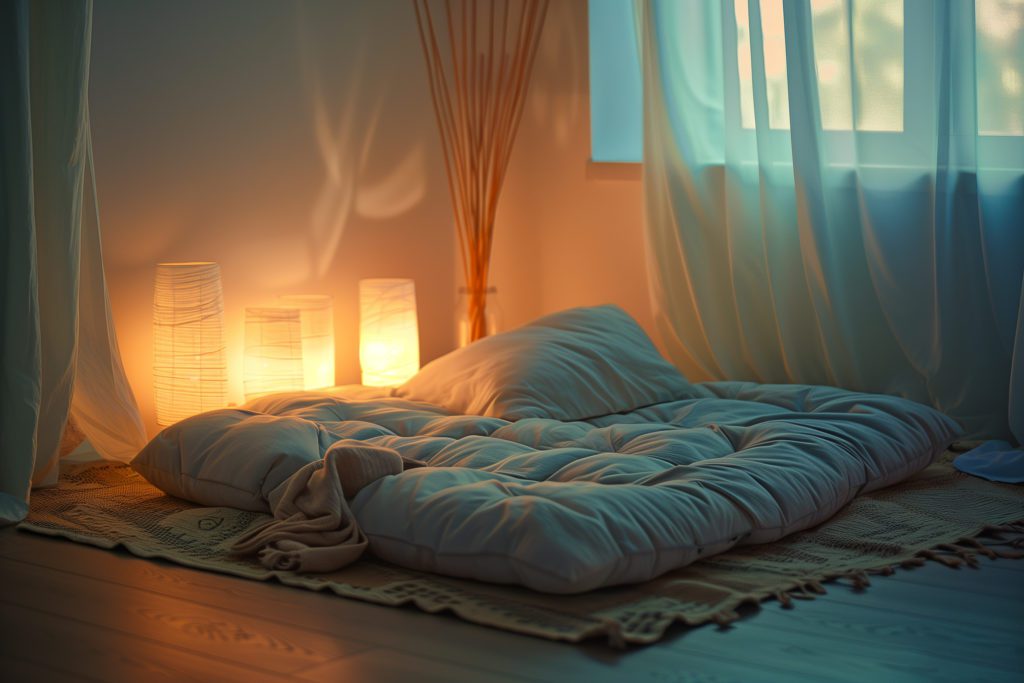
Creating an Optimized Sleep Environment
Optimizing your sleep environment can help you fall asleep faster, stay asleep through the night, and achieve better-quality sleep overall.

Getting good sleep has a positive impact on your health in general, and directly impacts how you feel when you are awake. Fortunately, taking a few simple steps to create a positive sleep environment can have an enormous effect on the quality of your sleep.
Sleep Environment Factors to Consider
There are several factors to keep in mind as you create your optimized sleeping space:
Mattress and Bedding
First, take care to choose a mattress that suits you. The amount of mattress options available can feel overwhelming, but you can narrow down your search by shopping according to your body type, primary sleeping position, and preferred mattress feel.
For example, heavier sleepers often sleep more comfortably on firmer, more supportive mattresses while lighter sleepers tend to prefer less firm options. Stomach sleepers typically benefit from a firm mattress that keeps the hips aligned with the shoulders, while side sleepers often achieve better spinal alignment with a softer, more conforming mattress. Some people prefer the body-hugging feel of memory foam mattresses, while others find memory foam to be too hot and prefer an innerspring model with greater airflow.
All of this to say, choosing the right mattress is a science—it doesn’t have to be a guessing game where you make a significant investment based on laying on a store model mattress for a few minutes.
In a similar vein, choose bedding that optimizes your comfort. Select a pillow that keeps your neck and spine in alignment based on your preferred sleeping position. For instance, side sleepers should look for a substantially thick pillow while stomach sleepers will generally want to opt for a thinner pillow.
When it comes to choosing sheets, it’s largely a matter of preference and temperature control. If you tend to sleep hot, look for cotton sheets that feel light and crisp. Or, if you are usually cold at night, choose a cozier material such as flannel or jersey for your sheets.
Noise Level
Unsurprisingly, it’s easier to achieve high-quality sleep in a quiet environment than it is in a loud one. Try to keep the noise level in your bedroom to a minimum to facilitate falling asleep quickly and to avoid sleep disruptions. Even if you feel like you can sleep through night-time noises, disturbances can cause you to wake briefly or prevent you from entering deep sleep stages. As a result, you may sleep through the night but still wake up feeling tired or groggy.
If outside noises are audible inside your room, try listening to music, wearing earplugs, or using a white or pink noise machine to minimize any disturbances. You may also wish to invest in noise-blocking curtains or other types of sound-proofing for your bedroom.
Introducing intentional and soothing sounds or music can actually help you relax before bed and fall asleep faster, and studies have shown that it can help ease anxiety and even physical pain as well.
Temperature
The temperature of your sleep environment also plays an important role in achieving restful sleep. Of course, everyone is different so one person may sleep hot while another sleeps cold, even in the same room. But, your core body temperature naturally drops during sleep, and sleeping in a cool environment helps maintain this lower body temperature and keep you asleep.
65 degrees Fahrenheit is considered to be the optimal sleeping temperature by many experts. However, some sleepers may find a 60-degree sleeping environment to be more comfortable while others might sleep better in a warmer 70-degree environment.
Many people enjoy the weight of their bedding on top of their bodies as well as the feeling of being nestled between the mattress and the comforter. In this case, it’s especially important to keep your bedroom cool enough that the addition of blankets and bedding will not cause you to become too hot and wake up in the night.
If you live in a warm climate and do not have air conditioning, use fans and open windows to keep your bedroom as cool as possible. Ensure that your sleepwear and bedding are optimized for staying cool as well—look for crisp, lightweight fabrics like cotton that won’t hold onto body heat. Additionally, choose a mattress that will help you stay cool. As mentioned above, memory foam is notorious for holding body heat and sleeping warm, while innerspring mattresses generally allow for better airflow and cooler sleep.
Lighting
Exposure to visible light or darkness triggers your brain to produce different hormones. It produces cortisol in response to light which causes you to feel awake and alert, and melatonin in response to darkness which helps you feel relaxed and sleepy. Your circadian rhythm (sleep-wake cycle) is guided by natural light and darkness cycles and the corresponding hormones that your body produces.
However, evening exposure to artificial light can alter your circadian rhythm and cause your body to produce less melatonin. This can make it more difficult to fall asleep, cause you to wake more throughout the night, and affect your sleep stages leading to less restful sleep.
While bright lighting in your home or bedroom can cause these issues, some of the biggest culprits are phones, TVs, and other electronic devices. Many people wind down at the end of the day by watching a show or movie, reading on a tablet, or scrolling through social media on a phone. But, these devices emit blue light, which is especially detrimental to melatonin production.
To create an optimized sleep environment, use dim, soft lighting in your home and especially your bedroom in the evening. Turn on blue light filters on your devices or wear blue light glasses if you must use them at night. Ideally, turn off the electronics before you begin your sleep routine in order to get the best possible sleep.
Cleanliness
Finally, ensure that your sleep environment is clean and tidy. Put away clutter, air out your bedroom frequently, dust and vacuum regularly, and wash your bedding at least twice a month. A freshly made bed with clean sheets is much more inviting than an unmade bed with wrinkled, tangled sheets. Plus, regularly washing helps prevent sweat, mites, and body oils from building up on bedding. Cleaning and tidying your bedroom regularly keeps the space relaxing and inviting, which in turn promotes better sleep.
References
- Kenneth I Hume , Mark Brink, Mathias Basner - Effects of environmental noise on sleep
https://pubmed.ncbi.nlm.nih.gov/23257581/ - Tabitha Trahan, Simon J. Durrant, Daniel Müllensiefen, Victoria J. Williamson - The music that helps people sleep and the reasons they believe it works: A mixed methods analysis of online survey reports
https://www.ncbi.nlm.nih.gov/pmc/articles/PMC6235300/ - Edward C. Harding, Nicholas P. Franks, William Wisden - The Temperature Dependence of Sleep
https://www.ncbi.nlm.nih.gov/pmc/articles/PMC6491889/ - Christine Blume, Corrado Garbazza, Manuel Spitschan - Effects of light on human circadian rhythms, sleep and mood
https://www.ncbi.nlm.nih.gov/pmc/articles/PMC6751071/

Written by
Cat Caroll
Articulate Writer and Analytical Editor
Download Pillow
Get help
Press & News
Legal
Connect
X (Twitter)
Company
Copyright © Neybox Digital Ltd.


